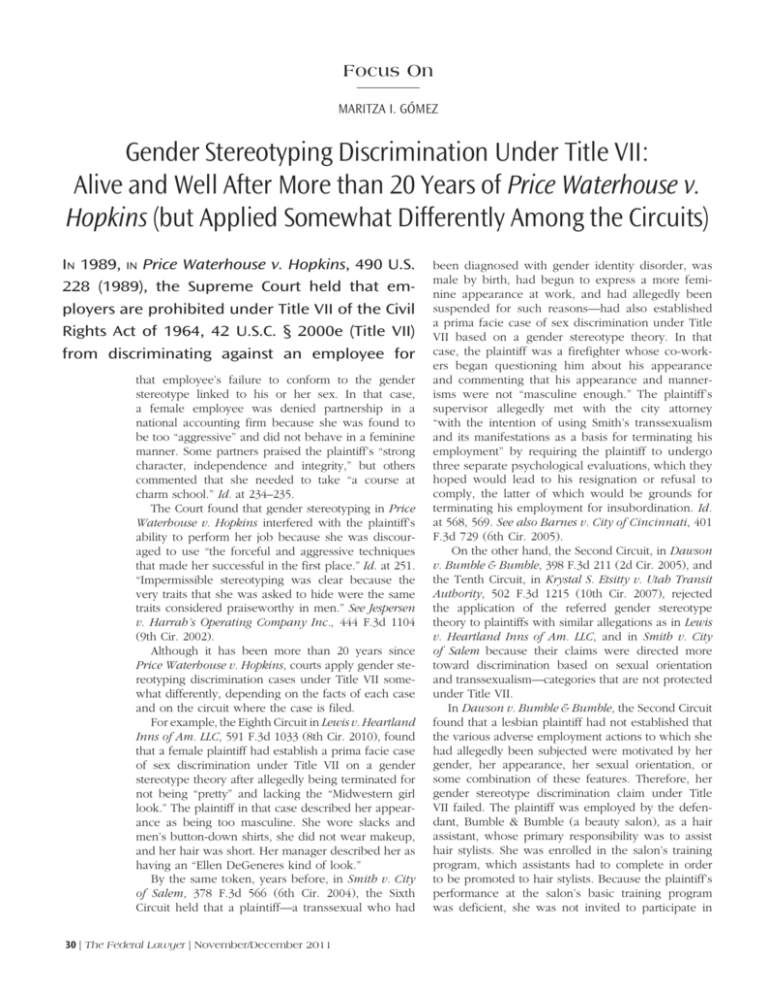
Focus On
Maritza I. Gómez
Gender Stereotyping Discrimination Under Title VII:
Alive and Well After More than 20 Years of Price Waterhouse v.
Hopkins (but Applied Somewhat Differently Among the Circuits)
In 1989, in Price Waterhouse v. Hopkins, 490 U.S.
228 (1989), the Supreme Court held that employers are prohibited under Title VII of the Civil
Rights Act of 1964, 42 U.S.C. § 2000e (Title VII)
from discriminating against an employee for
that employee’s failure to conform to the gender
stereotype linked to his or her sex. In that case,
a female employee was denied partnership in a
national accounting firm because she was found to
be too “aggressive” and did not behave in a feminine
manner. Some partners praised the plaintiff’s “strong
character, independence and integrity,” but others
commented that she needed to take “a course at
charm school.” Id. at 234–235.
The Court found that gender stereotyping in Price
Waterhouse v. Hopkins interfered with the plaintiff’s
ability to perform her job because she was discouraged to use “the forceful and aggressive techniques
that made her successful in the first place.” Id. at 251.
“Impermissible stereotyping was clear because the
very traits that she was asked to hide were the same
traits considered praiseworthy in men.” See Jespersen
v. Harrah’s Operating Company Inc., 444 F.3d 1104
(9th Cir. 2002).
Although it has been more than 20 years since
Price Waterhouse v. Hopkins, courts apply gender stereotyping discrimination cases under Title VII somewhat differently, depending on the facts of each case
and on the circuit where the case is filed.
For example, the Eighth Circuit in Lewis v. Heartland
Inns of Am. LLC, 591 F.3d 1033 (8th Cir. 2010), found
that a female plaintiff had establish a prima facie case
of sex discrimination under Title VII on a gender
stereotype theory after allegedly being terminated for
not being “pretty” and lacking the “Midwestern girl
look.” The plaintiff in that case described her appearance as being too masculine. She wore slacks and
men’s button-down shirts, she did not wear makeup,
and her hair was short. Her manager described her as
having an “Ellen DeGeneres kind of look.”
By the same token, years before, in Smith v. City
of Salem, 378 F.3d 566 (6th Cir. 2004), the Sixth
Circuit held that a plaintiff—a transsexual who had
30 | The Federal Lawyer | November/December 2011
been diagnosed with gender identity disorder, was
male by birth, had begun to express a more feminine appearance at work, and had allegedly been
suspended for such reasons—had also established
a prima facie case of sex discrimination under Title
VII based on a gender stereotype theory. In that
case, the plaintiff was a firefighter whose co-workers began questioning him about his appearance
and commenting that his appearance and mannerisms were not “masculine enough.” The plaintiff’s
supervisor allegedly met with the city attorney
“with the intention of using Smith’s transsexualism
and its manifestations as a basis for terminating his
employment” by requiring the plaintiff to undergo
three separate psychological evaluations, which they
hoped would lead to his resignation or refusal to
comply, the latter of which would be grounds for
terminating his employment for insubordination. Id.
at 568, 569. See also Barnes v. City of Cincinnati, 401
F.3d 729 (6th Cir. 2005).
On the other hand, the Second Circuit, in Dawson
v. Bumble & Bumble, 398 F.3d 211 (2d Cir. 2005), and
the Tenth Circuit, in Krystal S. Etsitty v. Utah Transit
Authority, 502 F.3d 1215 (10th Cir. 2007), rejected
the application of the referred gender stereotype
theory to plaintiffs with similar allegations as in Lewis
v. Heartland Inns of Am. LLC, and in Smith v. City
of Salem because their claims were directed more
toward discrimination based on sexual orientation
and transsexualism—categories that are not protected
under Title VII.
In Dawson v. Bumble & Bumble, the Second Circuit
found that a lesbian plaintiff had not established that
the various adverse employment actions to which she
had allegedly been subjected were motivated by her
gender, her appearance, her sexual orientation, or
some combination of these features. Therefore, her
gender stereotype discrimination claim under Title
VII failed. The plaintiff was employed by the defendant, Bumble & Bumble (a beauty salon), as a hair
assistant, whose primary responsibility was to assist
hair stylists. She was enrolled in the salon’s training
program, which assistants had to complete in order
to be promoted to hair stylists. Because the plaintiff’s
performance at the salon’s basic training program
was deficient, she was not invited to participate in
the advanced training seminar and was ultimately
terminated.
According to the plaintiff, at the time she was terminated by her employer, she was told that she was
being terminated because she “seemed unhappy”
and because of the way she dressed and wore her
hair. She also contended that her failure to advance
in Bumble & Bumble’s training program and her termination were the result of a discriminatory animus.
As to the training program, the plaintiff alleged that it
was repeatedly made clear to her that females rarely
attained the position of hair stylist. With respect to her
work on the salon floor as a hair assistant, the plaintiff
alleged that she was subjected to a hostile work environment because of her sex. She claimed that “she
was constantly harassed about her appearance, that
she did not conform to the image of women, and that
she should act in a manner less like a man and more
like a woman.” The plaintiff claimed that she suffered
discrimination on the basis of sex, sex stereotyping,
and/or sexual orientation in violation of federal, state,
and municipal law.
As previously explained, the Second Circuit rejected the plaintiff’s claims in the case. The court could
not discern if the plaintiff was claiming discrimination based on her sexual orientation under Title VII,
which is not a protected category under such law, or
because of her sex based on a gender stereotype theory. The court also determined that the plaintiff had
not produced any substantial evidence from which
the court could have inferred that her alleged failure
to conform her appearance to feminine stereotypes
resulted in her suffering any adverse employment
action by her employer.
In Krystal S. Etsitty v. Utah Transit Authority, the
Tenth Circuit determined that transsexuals are not a
protected class for purposes of Title VII and that the
prohibition against sex stereotyping recognized by
some courts should not be applied to transsexuals
because of their transsexualism per se. The plaintiff
in this case was a transsexual who born as a biological male and given the name “Michael, but identified
herself as a woman and had always believed she was
born with the wrong anatomical sex organs. Plaintiff
lived and dressed as a woman outside of work and
used the female name of ‘Krystal.’”
The plaintiff applied for a position as a bus operator with the Utah Transit Authority (UTA). She was
hired after successfully completing a six-week training course and was assigned to a position as an extraboard operator. She was not assigned to a permanent
route or shift, but instead she would fill in for regular
operators who were on vacation or called in sick. As
a result, the plaintiff drove many of the UTA’s 115 to
130 routes in the Salt Lake City area over approximately 10 weeks as an extra-board operator.
The UTA’s employees use public restrooms while
on their routes. Throughout her training period at
the UTA, the plaintiff presented herself as a man and
used male restrooms. Soon after being hired she met
with her supervisor, Pat Chatterton, and informed him
that she was a transsexual. She explained that she
would begin to appear more as a female at work and
that she would eventually change her sex. Chatterton
expressed support for plaintiff and stated that he did
not see any problem with her being a transsexual.
After the meeting, the plaintiff began wearing makeup, jewelry, and acrylic nails at work. She also began
using female restrooms while on her route.
The operations manager of the UTA division
where plaintiff worked heard a rumor that there
was a male operator who was wearing makeup.
The operations manager spoke with Chatterton, who
informed her that the plaintiff was a transsexual and
would be going through a sex change operation.
When Chatterton told the operations manager this,
she expressed concern about whether plaintiff would
be using a male or female restroom. The operations
manager told Chatterton that she would speak with
the Office of Human Resources about whether the
plaintiff’s use of the restroom would raise any concerns for the UTA.
After the operations manager discussed the issue
with the Office of Human Resources, the Utah Transit
Authority decided to terminate the plaintiff because of
possible liability arising from her use of the women’s
restroom. The plaintiff sued the UTA for sex discrimination under Title VII, alleging that she was terminated because she was a transsexual and because
she had failed to conform to the UTA’s expectations
of stereotypical male behavior. The court determined
in that case that the UTA’s reasons for terminating
plaintiff—its concerns about the plaintiff’s use of the
women’s restroom—was a legitimate nondiscriminatory reason to terminate the plaintiff.
Although the gender stereotype theory under Title
VII that had been established in Price Waterhouse
v. Hopkins has been applied somewhat differently
among the circuits through the years and is seldom
successful because of its complexity, it is very clear
that the courts still recognize the theory as a possible
cause of action under Title VII. However, the outcome of such claims will depend on a case-by-case
analysis that may vary depending and on the circuit,
unless the theory is further clarified by the Supreme
Court in a future case. TFL
Maritza I. Gómez is a partner at the law firm
of Goldman, Antonetti & Córdova PSC (www.
gaclaw.com) and a director of the FBA’s Hon.
Raymond L. Acosta, Puerto Rico Chapter. Her
practice focuses on representing employers
in cases involving labor and employment issues. She can be reached at maritza.gomez@
gaclaw.com. © 2011 Maritza I. Gómez. All
rights reserved.
November/December 2011 | The Federal Lawyer | 31


![[2012] NZEmpC 75 Fuqiang Yu v Xin Li and Symbol Spreading Ltd](http://s3.studylib.net/store/data/008200032_1-14a831fd0b1654b1f76517c466dafbe5-300x300.png)




